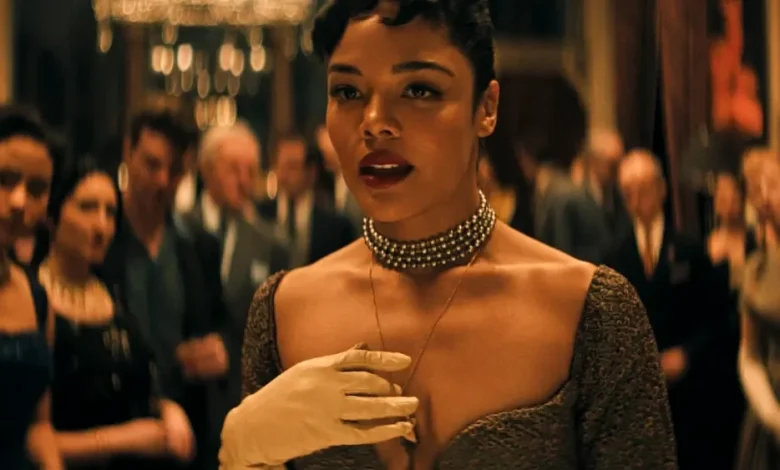‘Hedda’ Review: Tessa Thompson Sinks Her Talons Into a Rich Stage Role Boldly Reinvented for the Big Screen

On the chain around Hedda Gabler’s neck hangs a key to her father’s gun case. One needn’t be a genius to deduce that the key will be used, and eventually the gun as well, in writer-director Nia DaCosta’s sharpened-claws adaptation of the classic Henrik Ibsen play, which stars Tessa Thompson as a singularly destructive social creature whose best-laid plans backfire when she opts for status over love. As Chekhov advised two years before “Hedda Gabler” was first performed, ”One must not put a loaded rifle on the stage if no one is thinking of firing it.” To which Ibsen might add: or a sniper like Hedda without a house full of targets.
What does take brains is transposing “Hedda” from 1891 to the 1950s, manipulating critical details of the characters’ identities in the process. In DaCosta’s telling, Hedda is Black and bisexual; her ill-fated ex-lover, Eilert Lövborg, has been rechristened Eileen (played by Nina Hoss); and the provocative book manuscript that Lövborg brings to the party is no longer an abstract treatise on where civilization is headed. More precisely, “as some past hidden things have become normalized, I wonder why shouldn’t hidden things in the now become normal in the future?” the openly queer Eileen asks a room full of salivating male cohorts.
Not everyone knows Ibsen going in, but that needn’t diminish the satisfaction of watching “Hedda Gabler” so vividly reinvented. Together with production designer Cara Brower, DaCosta has constructed an exquisite gilded cage into which the title character has forced herself: a grand but decaying old mansion with labyrinthine gardens, a treacherous chandelier and art deco wallpaper. Hedda wanted financial comfort, and so she settled, marrying George Tesman (Tom Bateman, looking every bit a young Colin Firth) instead of trying to make it work with the brilliant but alcoholic Eileen.
Now, George and Eileen are being considered for the same academic position, and Hedda figures that she must sink one for the other to succeed — a scheme that will play out over the course of an evening that spirals so far out of hand, it calls to mind the bacchanalian first act of “Babylon,” with none of that movie’s other nonsense. “Hedda” opens with a police interrogation before flashing back to follow its Hepburn-like antiheroine as she strides through the halls of her enormous house, banishing all flower arrangements as she prepares for that night’s party. When Judge Brack (Nicholas Pinnock) appears, she shoots one of her father’s pistols in his general direction — the first but not last time a gun goes off in the film.
DaCosta finds no need to add dialogue directly addressing Hedda’s race or sexuality for those dimensions to add fresh layers the character’s actions. Extending her already impressive range, Thompson carries herself like a blue-blood, her spine straight and lips pursed, all the better to sharpen her features. When she speaks, her mouth hardly opens, but we can still feel her fangs. Hedda’s selective with her words (for such a literate script, dialogue tends to be delivered in short, clipped fragments), drawing blood through expert timing and the near-lethal use of pauses. At the level of society where “Hedda” takes place, insults are constantly flying, yet are rarely stated explicitly, which makes great sport of each exchange as audiences keep score.
As the evening unfolds, Hedda’s job is to lubricate the estimable Professor Greenwood (Finbar Lynch), in whose hands her husband’s fate lies. But Eileen’s arrival — accompanied by her new lover and out-of-her-depth co-author Thea Clifton (Imogen Poots) — complicates those plans and sets an altogether more diabolical series of events in motion: Hedda will get Eileen drunk, steal the only copy of her manuscript and sabotage any chance she may have of upstaging poor George. Doing so won’t bring Hedda any satisfaction (in the original play, it leads to her suicide), but it at least ensures that Eileen is in no position to experience success or happiness with someone other than her.
Why so cruel? More than ever, we feel the oppressive forces of gender and class suffocating Hedda, whose proto-feminist actions might even seem admirable (or at least excusable) to some, given how limited her social options appear to be. By reimagining Lövborg as a woman — and casting someone as formidable as Hoss in the role — DaCosta provides an illuminating contrast: The lesbian relationship Eileen and Hedda once shared was an attempt at happiness free of men. Hedda “switched sides,” but Eileen remains defiant, planning one bestseller to placate the critics (“so I put nothing remotely controversial in the book”) and its brilliant follow-up so that she might finally be “protected from ridicule.”
Now they find themselves at the same party, withdrawing from the crowd for private conversations in which each tries to ascertain whether any passion remains. DaCosta films it all with a ferociously cinematic flamboyance, banishing any charges of staginess. Playing to the camera, the ensemble accentuates the broad gap between what is spoken and what can be conveyed through body language, tone or a cutting glance, with a powerful assist from “Tár” composer Hildur Guðnadóttir’s anxiety-inducing score, in which sharp drums and human gasps compound the claustrophobia.
As weapons go, Thompson’s eyelashes are far more lethal than those pistols of hers. Because the film has been set in one of Hollywood’s most restrictive periods, DaCosta is free to challenge 1950s values — hence, a new interpretation for Hedda’s actions that stems from her repressed homosexuality, and an exploration of power dynamics that plays out through sex. Instead of maniacally feeding Lövborg’s “baby” into the fire, as Hedda does in the play, she commands George to “do that thing with your mouth” while the flames dance in the background. It’s a bold reinterpretation of the material, with revelations aplenty. If you can’t handle a little good chaos, perhaps better to take Eileen’s advice and stay out of the path of destruction.





